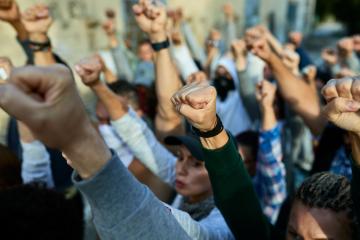
Using research to combat internalized bias

Combating internalized biases is an important step in building equitable, fair societies. Sometimes internalized biases are implicit, meaning individuals may unknowingly associate stereotypes with certain social groups or have certain beliefs that they are not aware of. In other instances, they may be conscious of their biases but have difficulty overcoming them. Identifying strategies to combat this type of bias is critical for fighting prejudice and discrimination.
Despite growing support for policies and programs aimed at tackling discrimination, more research is needed to identify which strategies are effective and in which contexts. Research in social psychology, for instance, has developed several techniques to help individuals overcome their biases. While these have been shown to be effective in lab settings, there has been little work to study such strategies in real-world contexts. This research is essential for incorporating effective approaches into everyday programs.
With these considerations in mind, J-PAL hosted a webinar on April 11, 2022 focused on combating discrimination. We were joined by Sule Alan (European University Institute), Diag Davenport (University of Chicago), and Jenan Mohajir, Senior Director of Special Projects at Interfaith Youth Core, for a conversation moderated by Marianne Bertrand (University of Chicago; Co-Chair, J-PAL Labor Sector). The speakers shared their work and discussed the need for more evidence around effective programs to combat discriminatory practices. Read on for a recap of key insights from the panelists.
The state of the field
During the session, the panelists discussed their priorities related to combating bias and highlighted how research can help further our understanding of effective strategies.
Sule Alan, a professor of economics, presented findings from a randomized evaluation in Turkey that found promising impacts of using an approach from social psychology known as perspective-taking to reduce bias against Syrian refugee students. This approach, which involves helping individuals learn to understand the point of view of someone they are biased against, has often been tested in lab settings with promising results. Professor Alan and her collaborators drew from those learnings to design a curriculum for Turkish classrooms and found that the intervention reduced violence and victimization and reduced social isolation. Increased friendships between Turkish and Syrian refugee children also persisted 2.5 years later, despite school closures that occurred as a result of the Covid-19 pandemic.
Diag Davenport, a PhD student in behavioral science, discussed preliminary evidence and open questions on the intersection of algorithmic decision-making and human bias. He highlighted the need for research around methods to reduce the “double penalty” that occurs when humans make biased choices on top of a set of biased options presented by algorithms. Algorithms and machine learning present potentially valuable opportunities to mitigate the effects of internalized biases—for example, they can be trained to detect and demote bias-inducing situations and actions, but they present many challenges as they are currently designed and used.
Jenan Mohajir, Senior Director of Leadership, shared insights from Interfaith Youth Core’s IDEALS research project that examines how college students engage with religious and worldview diversity. Results from longitudinal surveys show that the environment and setting in which relationship building takes place are important factors in how students overcome biases to form meaningful relationships across differences in religion, ideology, and other elements of identity.
Together, these panelists highlighted the importance of combating bias in both in-person and online spaces, providing suggestions for approaches that may be particularly effective.
Looking forward
Overcoming internalized bias is a critical step towards fighting discrimination and building equitable societies. Fortunately, tools and strategies that can help individuals recognize and overcome biases they may not be aware of have been developed and tested for decades in laboratory settings by researchers from different fields. Adapting these tools to real-world settings and testing their ability to prevent discriminatory behavior and practices can help practitioners understand what policies and interventions are particularly effective in changing mindsets and beliefs.
This work is important not just for in-person interactions but also online. As people around the world are increasingly interconnected via social media, better understanding the impact of algorithms on decision-making and the ways in which algorithms themselves may also be biased is a prerequisite for combating bias and discrimination in online platforms.
An important next step is to combine the expertise of practitioners in this space, who have spent decades developing and implementing context-specific programs, and of researchers, who bring experience in conducting real-world evaluations that can elucidate how and why such programs are effective. Doing so in a systematic way will shed light on what types of interventions are particularly impactful at changing mindsets and worldviews, reducing bias in decision-making, and–ultimately–combating discrimination.
Missed the webinar? You can watch it here.




